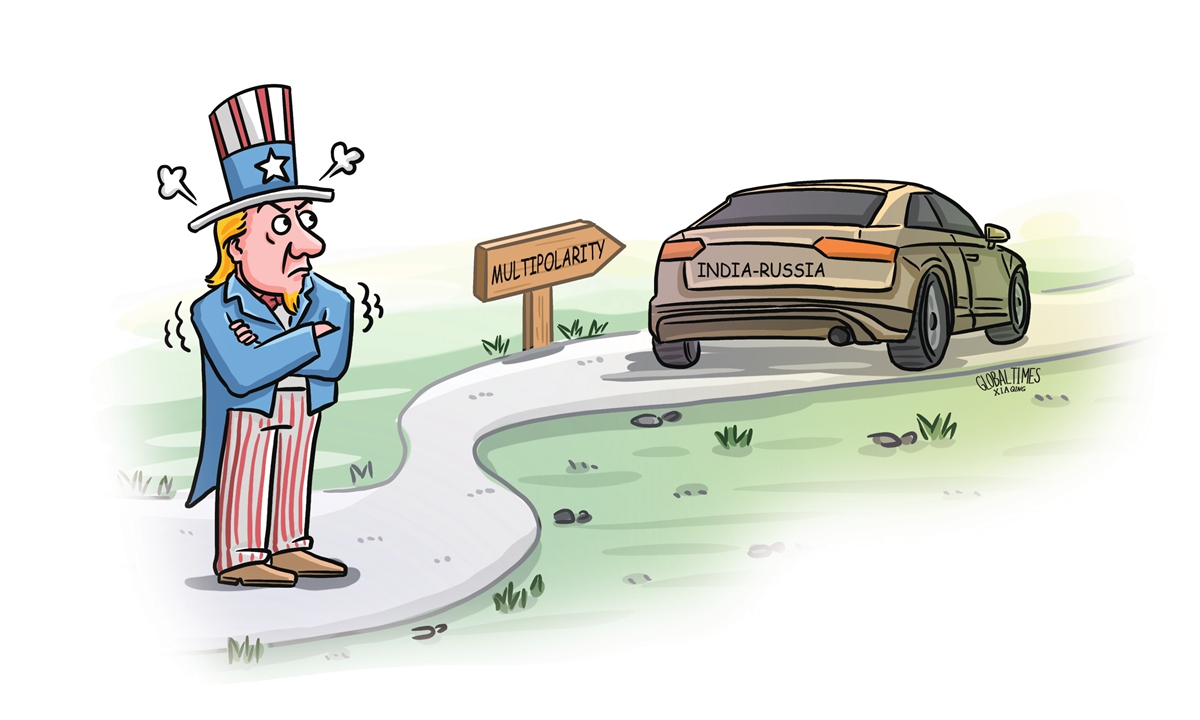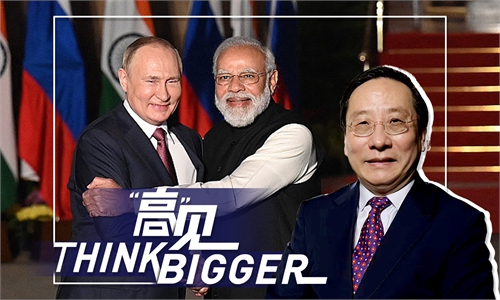
Illustration: Xia Qing /GT
Indian Prime Minister Narendra Modi started his two-day visit to Russia on Monday, marking his first foreign visit since beginning his third term in office. However, some Western media have been watching the visit closely and with apprehension, insinuating that China's growing relations with Russia could potentially strain India-Russia relations, which Chinese analysts criticized as an attempt to sow discord and also highlighted the West's growing concerns over New Delhi's deepening ties with Moscow.
Modi will be in Moscow on Monday and Tuesday for the 22nd India-Russia Annual Summit. According to India's Ministry of External Affairs, the two leaders will review the "entire range of multifaceted relations" between the two countries and exchange views on contemporary regional and global issues of mutual interest.
Modi's agenda in Moscow will be "extensive", while the two leaders will be able to have "informal talks," according to Kremlin spokesman Dmitry Peskov, who was cited by Russian media as saying that they are expecting a very important and "full-fledged visit," which is crucial for Russian-Indian relations.
Modi's last visit to Russia was in 2019 when he attended an economic meeting in Vladivostok. The Western media are paying close attention to Modi's ongoing visit to Russia, highlighting that this is also his first visit to the country since the Russia-Ukraine conflict erupted in February 2022. Some media outlets, including VOA, claimed that Modi's goal is to ensure that Russia's ties with China will not affect its ties with India.
The West is more concerned with India's deepening ties with Russia, some experts said. China does not view closer Russian-Indian relations as a threat, whereas Western countries are increasingly dissatisfied with India's relations with Russia, Long Xingchun, a professor from the School of International Relations at Sichuan International Studies University, told the Global Times on Monday.
In contrast to the criticism and pressure China has received from the US and West over the Russia-Ukraine conflict, India has faced less criticism for not condemning Russia or joining the West in imposing sanctions. Instead, it has maintained ties with Russia and capitalized on buying oil from it and selling it to European countries, making significant profits, said Long.
Western countries have sought to pull India into the Western camp and counterbalance China's influence, but India's response has not reciprocated the political and diplomatic gestures extended by the West, which has increasingly disappointed them, said Long.
Despite Western pressure, Modi opted for Russia as his first destination for a foreign visit after beginning his third term last month. This move not only aims to strengthen India's ties with Russia but also enhances its leverage in dealing with the US and other Western nations, analysts said.
Long noted that Modi's visit to Russia this time may focus on bilateral cooperation, especially in the defense industry and economic cooperation in the energy sector.
The longstanding defense cooperation makes it difficult to replace Russia's position in India's defense sector in the short term. Although there is a push for the US to gradually replace Russia as India's main weapons supplier, this transition undoubtedly requires time. For a large country like India, maintaining stable relations with Russia and continuing the defense industry cooperation are crucial, said the expert.
Discussions between Modi and Putin may also include international issues. Regarding the Ukraine crisis, although there is no clear solution yet, India may propose its own ideas. Whether or not those proposals can ultimately be realized, they will attract international attention and underscore India's international influence, Long said.
Analysts noted that India's relations with both Russia and the West reflect a complex international landscape, which also underscored the countries' efforts to maintain their own interests while seeking a balance in an unpredictable global political environment.
Currently, the West may be more inclined to hype relations between China, Russia and India, attempting to sow discord among the three. However, in reality, the West itself may have more reason for concern as it is hoping that India stands against Russia, aligning with them, said Long, noting that India's foreign policy tends to maintain balance without leaning fully towards any side to amplify its own interests.


